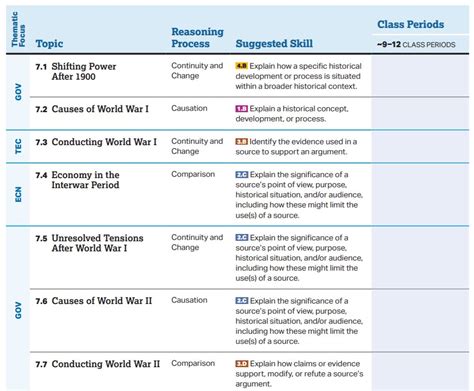Prepare for success in your AP World History exam with an in-depth review of Unit 5: The Global Transformations of the Twentieth Century. This article provides a comprehensive overview of key concepts, themes, and events covered in the unit, empowering you to tackle the exam with confidence.

Industrialization and Imperialism
Industrialization:
- Definition: The process of transitioning from an agricultural-based to an industrial-based economy.
- Causes: Technological advancements, increased urbanization, and the availability of capital.
- Impacts: Increased productivity, economic growth, urbanization, and social inequality.
Imperialism:
- Definition: The political, economic, and military domination of one country over another.
- Motivations: Acquisition of resources, markets, and colonies; national pride and competition.
- Impacts: Territorial expansion, economic exploitation, cultural assimilation, and resistance movements.
World War I and Its Aftermath
World War I:
- Causes: Nationalism, imperialism, militarism, and alliance systems.
- Key events: Assassination of Archduke Franz Ferdinand, Schlieffen Plan, trench warfare, Russian Revolution.
- Impacts: Massive casualties, geopolitical changes, and the rise of new ideologies.
Aftermath of World War I:
- Treaty of Versailles: Punitive peace treaty imposed on Germany, contributing to instability in Europe.
- League of Nations: International organization established to prevent war and promote cooperation.
- Rise of fascism: Authoritarian ideology that emerged in Italy, Germany, and Japan.
Global Interdependence and Conflict
Global Interdependence:
- Definition: The increasing interconnectedness and reliance of nations on one another.
- Causes: Technological advancements, economic globalization, and political cooperation.
- Impacts: Spread of ideas, cultural exchange, and economic integration.
World War II:
- Causes: Failure of the Treaty of Versailles, rise of fascism, and Japanese aggression.
- Key events: Blitzkrieg, Holocaust, atomic bombings, Allied victory.
- Impacts: Devastating human and material losses, redrawing of global boundaries, and the start of the Cold War.
The Cold War and Decolonization
Cold War:
- Definition: Ideological and political conflict between the United States and the Soviet Union.
- Key events: Berlin Blockade, Cuban Missile Crisis, Vietnam War, arms race.
- Impacts: Global tensions, nuclear proliferation, and the formation of alliances.
Decolonization:
- Definition: The process by which European colonies gained independence.
- Causes: Nationalism, anti-imperialism, and the weakening of European powers.
- Impacts: End of European imperialism, emergence of new nations, and global power shifts.
Social and Cultural Transformations
Demographic Changes:
- Population growth: Significant increase in global population, especially in developing countries.
- Urbanization: Rapid growth of cities, leading to social and economic challenges.
Social and Cultural Changes:
- Rise of mass media: Expansion of newspapers, radio, and television, shaping public opinion.
- Women’s rights movements: Struggles for equality and gender rights.
- Artistic and intellectual movements: Modernism, surrealism, and existentialism.
Technological Advancements:
- Scientific discoveries: Theory of relativity, quantum mechanics, antibiotics.
- Industrial innovations: Computers, nuclear power, space exploration.
- Environmental concerns: Rise of environmental awareness and the impact of industrialization.
Key Terms and Concepts
Terms to know:
- Imperialism
- Nationalism
- Fascism
- Bipolarity
- Globalization
- Decolonization
- Cold War
Concepts to understand:
- Industrialization and economic growth
- The causes and consequences of World War I and II
- The Cold War and its impact on global politics
- The rise of nationalism and decolonization
- Social and cultural transformations in the 20th century
Tips and Tricks
- Review regularly: Start studying early and review material frequently.
- Create study aids: Use flashcards, timelines, or summaries to aid memorization.
- Practice with past exams: Familiarize yourself with the exam format and question types.
- Seek guidance: Ask your teacher or a tutor for clarification on difficult concepts.
- Manage your time: Plan your study time wisely and stick to your schedule.
Common Mistakes to Avoid
- Overlooking the long-term causes and consequences of events: Focus on understanding the historical context and significance.
- Confusing similar concepts: Distinguish between terms like fascism, nationalism, and imperialism.
- Neglecting important dates and figures: Memorize key dates and events from the unit.
- Ignoring the impact of industrialization and globalization: Recognize their transformative effects on societies and economies.
- Failing to connect different themes: Understand the interrelationships between events and processes.
Conclusion
By mastering the concepts and themes covered in this AP World History Unit 5 review, you will equip yourself with a solid foundation for understanding the complexities of the 20th century. Remember to utilize tips and tricks, avoid common mistakes, and approach the exam with confidence. Good luck in your preparations!
Additional Resources
- AP World History Review Unit 5: Global Transformations 1900-1945
- AP World History Unit 5: The Global Transformations of the Twentieth Century
- AP World History Unit 5 Review: The Global Transformations of the Twentieth Century
